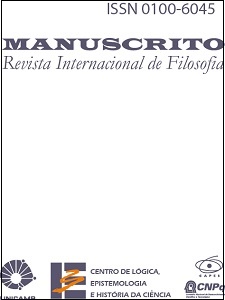Abstract
Human evolution is the subject of different kinds of research committed to different agenda. In this paper I will discuss various scenarios in which folk psychology plays a distinctive role in attempts to keep track of this evolution, making explicit what is distinctive about us, compared to other animal minds: special habilities for representation and, above all, for interpretation. This perspective takes seriously the image that we are agents constituted in a social and cultural environment, which is central to much of what is done in philosophy and the social sciences. I will discuss whether this image can be assimilated by contemporary evolutionary biology, without compromising its fundamental pressupositions and its characteristic conceptual and theoretical framework. Godfrey-Smith and Sterelny embrace this project and attempt to work out the details of this integration. Contrasting with nativist scenarios, which are grounded in poverty of the stimulus arguments, a scenario emerges from that project in which the evolution of the human mind interacts with our interpretative habilities. These habilities would be, in turn, the result of social learning, facilitated by a particular kind of niche construction involving non-genetic inheritance mechanisms.
References
ABRANTES, P. “Naturalizando a Epistemologia”. In: P. Abrantes (org.) (1995), pp. 171-218.
ABRANTES, P. (org.). Epistemologia e Cognição. Brasília: Editora da UnB, 1995.
ABRANTES, P. “Naturalismo Epistemológico: apresentação”. In: F. Évora e P. Abrantes (eds.) (1998), pp. 7-26.
ABRANTES, P. “Analogical Reasoning and Modeling in the Sciences”. Foundations of Science, v. 4, n. 3, pp. 237-270, 1999.
ABRANTES, P. “O Programa de uma Epistemologia Evolutiva”. Revista de Filosofia, v. 16, n. 18, pp. 11-55, 2004a.
ABRANTES, P. “Naturalismo em Filosofia da Mente”. In: A. Ferreira, M.E.Q. Gonzalez e J.C. Coelho (orgs.) (2004b), pp. 5-40.
ABRANTES, P., BENSUSAN, H. “Conhecimento, Ciência e Natureza: cartas sobre o naturalismo”. In: S. Simon-Rodrigues (ed.) (2003), pp. 273-333.
ALEXANDER, R.D. “The Evolution of Social Behavior”. Ann. Rev. Ecol. & Syst. v. 5, pp. 325-383, 1974.
AXELROD, R., HAMILTON, W.D. “The Evolution of Cooperation”. Science, v. 211, pp. 1390-1396, 1981.
BAKER, L.R. Explaining Attitudes: a practical approach to the mind. Cambridge: Cambridge University Press, 1995.
BRANDON, R.N. Adaptation and Environment. Princeton, NJ: Princeton University Press, 1995.
BULLER, D.J. Adapting Minds: evolutionary psychology and the persistent quest for human nature. Cambridge, Mass: The MIT Press, 2005.
BYRNE, R., WHITEN, A. (eds.). Machiavelian Intelligence. Oxford: Clarendon Press, 1988.
CARRUTHERS, P., CHAMBERLAIN, A. (eds.). Evolution and the Human Mind. Cambridge: Cambridge University Press, 2000.
CARRUTHERS, S., LAURENCE, S., STICH, S. (eds.). The Innate Mind: culture and cognition. Cambridge University Press. No prelo.
CHURCHLAND, P.M. “Folk Psychology (2)”. In: S. Guttenplan (ed.) (1995), pp. 308-316.
CLAPING, H., STAINES, P., SLEZAK, P. (eds.). Mental Representation. Elsevier, 2004. No prelo.
CLARK, A. “Review: Thought in a Hostile World: the evolution of human
cognition”. Mind, v. 114, n. 455, pp. 777-782, 2005.
COWIE, F. What’s Within? Nativism reconsidered. New York: Oxford University Press, 1999.
CUMMINS, R. “Functional Analysis”. In: E. Sober (ed.) (1995), pp. 49-69.
DENNETT, D. “The Intentional Stance in Theory and Practice”. In: R.Byrne and A. Whiten (eds.) (1988), pp. 180-202.
DENNETT, D. Darwin’s Dangerous Idea: evolution and the meanings of life. New York: Simon & Schuster, 1995.
DENNETT, D. “Two Contrasts: folk craft versus folk science, and belief versus opinion”. In: D. Dennett (ed.) (1998), pp. 81-94.
DENNETT, D.(ed.). Brainchildren: essays on designing minds. Cambridge, Mass: The MIT Press, 1998.
DENNETT, D. “True Believers”. In: Lycan, W. (ed.) (1999), pp. 75-87.
DUNBAR, R. “On the Origin of the Human Mind”. In: P. Carruthers and A. Chamberlain (eds.) (2000), pp. 238-253.
ÉVORA, F., ABRANTES, P. (eds.). Naturalismo Epistemológico. Cadernos de História e Filosofia da Ciência, Série 3, v. 8, n. 2, 1998.
FERREIRA, A., GONZALEZ, M. E. Q., COELHO, J. C. (orgs.). Encontro com as Ciências Cognitivas, v. 4. São Paulo: Editora Cultura Acadêmica, 2004b.
FUTUYMA, D. Biologia Evolutiva. Sociedade Brasileira de Genética, 2ªed., 1992.
GIERE, R.N. Explaining Science. Chicago: The University of Chicago Press, 1988.
GODFREY-SMITH, P. “Replies to Sober, Sterelny and Neander”. Biology and Philosophy, v. 12, pp. 581-590, 1997.
GODFREY-SMITH, P. Complexity and the Function of Mind in Nature. Cambridge: Cambridge University Press, 1998a.
GODFREY-SMITH, P. “Functions: consensus without unity”. In: D. Hull and M. Ruse (eds.) (1998b), pp. 280-292.
GODFREY-SMITH, P. “On the Status and Explanatory Structure of Developmental Systems Theory”. In: S. Oyama, P. Griffiths and R. D. Gray (eds.) (2001), pp. 283-297.
GODFREY-SMITH, P. “On the Evolution of Representational and Interpretive Capacities”. The Monist, v. 85, n.1, pp. 50-69, 2002a.
GODFREY-SMITH, P. “Environmental Complexity and the Evolution of Cognition”. In: R. Sternberg and J. Kaufman (eds.) (2002b), pp. 233-249. A paginação que uso no artigo é a da versão disponível na página pessoal do autor na Internet.
GODFREY-SMITH, P. “Folk Psychology under Stress: comments on Susan Hurley’s ‘Animal Action in the Space of Reasons’”. Mind & Language, v. 18, n. 3, pp. 266-272, 2003.
GODFREY-SMITH, P. “On Folk Psychology and Mental Representation”. In: H. Claping, P. Staines and P. Slezak (eds.) (2004), pp. 147-162. No prelo.
GODFREY-SMITH, P. “Untangling the Evolution of Mental Representation”. In: A. Zilhão (ed.), no prelo. A paginação que uso no artigo é a da versão disponível na página pessoal do autor na Internet.
GODFREY-SMITH, P. “Folk Psychology as a Model”. Palestra apresentada na RSSS (Universidade Nacional Australiana) em setembro de 2003.
GOULD, S.J., LEWONTIN, R.C. “The Spandrels of San Marco and the Panglossian Paradigm: a critique of the adaptationist programme”.
In: E. Sober (ed.) (1995), pp. 73-90.
GUTTENPLAN, S. (ed.). A Companion to the Philosophy of Mind. Oxford: Blackwell, 1995.
HEYES, C., HUBER, L. (eds). The Evolution of Cognition. Cambridge, Mass: The MIT Press, 2000.
HULL, D., RUSE, M. (eds.). The Philosophy of Biology. Oxford: Oxford University Press, 1998b.
HUMPHREY, N. “The Social Function of Intellect”. In: P.P.G. Bateson and R. A. Hinde (eds.) Growing Points in Ethology, 1976. Repr. in R.
Byrne and A. Whiten (eds.) (1988), pp. 13-26.
KITCHER, P. “Function and Design”. In: D. Hull and M. Ruse (eds.). (1998), pp. 258-279.

